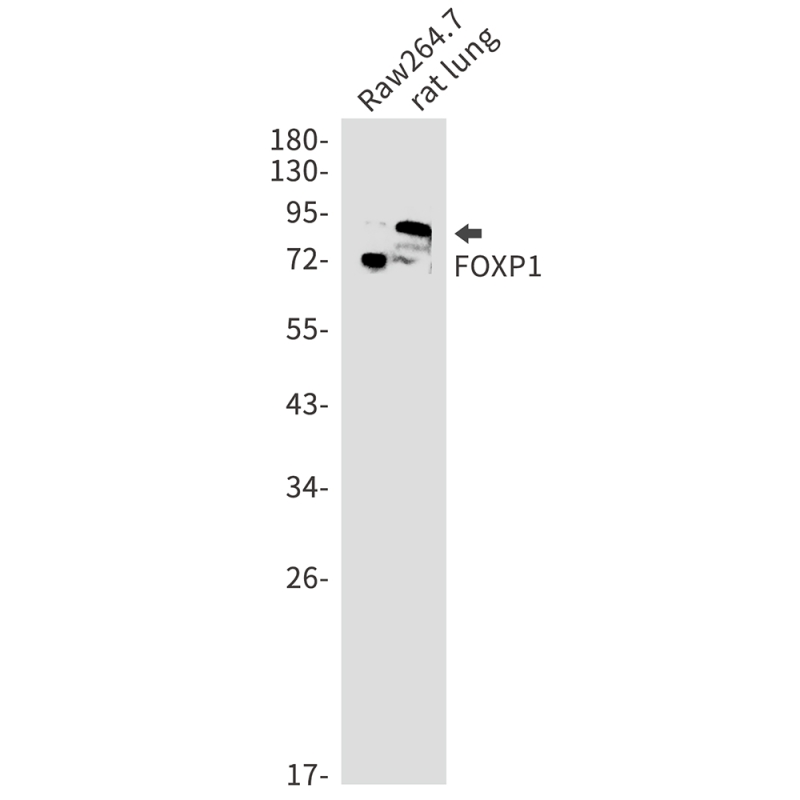
| WB | 咨询技术 | Mouse,Rat |
| IF | 1/20 | Mouse,Rat |
| IHC | 1/50-1/100 | Mouse,Rat |
| ICC | 1/50-1/200 | Mouse,Rat |
| FCM | 咨询技术 | Mouse,Rat |
| Elisa | 咨询技术 | Mouse,Rat |
| Aliases | FOXP1; HSPC215; Forkhead box protein P1 |
| Entrez GeneID | 27086 |
| WB Predicted band size | Calculated MW: 75 kDa; Observed MW: 82-90 kDa |
| Host/Isotype | Rabbit IgG |
| Antibody Type | Primary antibody |
| Storage | Store at 4°C short term. Aliquot and store at -20°C long term. Avoid freeze/thaw cycles. |
| Species Reactivity | Mouse,Rat |
| Immunogen | A synthetic peptide of human FOXP1 |
| Formulation | Purified antibody in TBS with 0.05% sodium azide,0.05%BSA and 50% glycerol. |
+ +
以下是关于FOXP1抗体的3篇参考文献示例:
1. **文献名称**:*FOXP1 is a prognostic biomarker for diffuse large B-cell lymphoma*
**作者**:Barrans et al.
**摘要**:该研究通过免疫组化(使用FOXP1抗体)分析了FOXP1蛋白在弥漫性大B细胞淋巴瘤(DLBCL)中的表达,发现其高表达与患者不良预后显著相关,提示FOXP1可作为独立预后标志物。
2. **文献名称**:*FOXP1 mutations cause neurodevelopmental disorders with language impairments*
**作者**:Sollis et al.
**摘要**:研究通过Western blot和免疫荧光(使用特异性FOXP1抗体)检测患者细胞系,发现FOXP1基因突变导致蛋白功能异常,与儿童语言发育障碍及认知缺陷密切相关。
3. **文献名称**:*FOXP1 expression in lung adenocarcinoma: Clinical significance and molecular mechanisms*
**作者**:Wang et al.
**摘要**:该研究利用FOXP1抗体进行组织芯片染色,发现FOXP1在肺腺癌中低表达且与肿瘤侵袭性增强相关,机制研究提示其通过调控上皮-间质转化(EMT)通路影响转移。
注:以上文献为示例,实际引用时需核实具体来源及细节。如需精准文献,建议通过PubMed或Web of Science以“FOXP1 antibody”为关键词检索近年研究。
The FOXP1 antibody is a crucial tool in biomedical research, targeting the Forkhead Box P1 (FOXP1) protein, a transcription factor belonging to the FOX family. FOXP1 regulates gene expression involved in immune system function, organ development, and cellular differentiation. It plays dual roles in cancer and neurodevelopment, acting as a tumor suppressor or oncogene depending on context, and is linked to neurodevelopmental disorders like autism and intellectual disabilities.
FOXP1 antibodies are widely used to detect protein expression and localization via techniques like Western blotting, immunohistochemistry (IHC), and immunofluorescence (IF). In cancer research, they help assess FOXP1's prognostic value in lymphomas (e.g., diffuse large B-cell lymphoma) and solid tumors. In neuroscience, these antibodies aid in mapping FOXP1 expression patterns in brain regions critical for cognition and language.
Commercial FOXP1 antibodies are typically monoclonal or polyclonal, requiring rigorous validation for specificity and cross-reactivity. Challenges include distinguishing FOXP1 isoforms and ensuring consistent performance across tissue types. Ongoing research leverages these antibodies to explore FOXP1's therapeutic potential and molecular interactions, cementing their role in both basic science and clinical diagnostics.
×